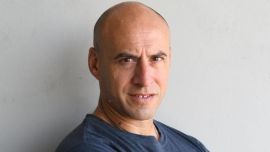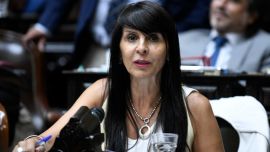Economists are warning of the so-called “February trap,” when prices accelerate amid elevated cash in circulation due to Christmas holiday spending, given that the policy rate was reduced 13 percentage points in just over a month.
Central Bank Governor Miguel Pesce, who took over with the new government on December 1., is cutting rates to try to end a slump in economic activity. The floor of the policy rate is now at 50 percent – below annual inflation of 54 percent – and compared with 63 percent when he started his mandate.
In a statement to Bloomberg, Pesce said there aren’t inflation concerns in the short term, but that the bank is aware of a possible impact on prices over a longer period.
“The inflationary risk isn’t immediate but medium-term,” Pesce said. “In February, the excess cash demand produced in December and January for holidays, Christmas bonuses and vacations returns to the banks.”
CHRISTMAS EFFECT
Demand for pesos spikes every December as Argentines get a Christmas bonus on top of their monthly paycheque, and many need cash for vacation break in the southern hemisphere’s summer. Demand returns to normal by February, when the holidays end.
If the bank leaves too many pesos in circulation when demand is falling in the post-Christmas period, that can stoke a peso devaluation and inflation, especially when combined with interest rate cuts. This effect has been seen in recent years.
The average amount of notes and coins held by the public rose 11.5 percent in December from the previous month.
“The Central Bank doesn’t seem to be taking the best course of action to confront the February trap,” Adrian Yarde Buller, chief economist at local broker SBS, wrote in a recent note to clients. “History could repeat itself in 2020.”
Some of Pesce’s predecessors cut interest rates in January, only to raise them again as prices spiked, hurting the bank’s credibility.
Pesce argues against keeping interest rates exorbitantly high, but acknowledges that having the benchmark rate below annual inflation – known as negative real rates – isn’t the solution to cooling prices.
“Until banks can ‘manage’ this money, you have to prevent it from provoking interest rate distortions,” Pesce said in the statement. “The evidence that extravagantly high interest rates don’t contribute to reducing inflationary inertia doesn’t mean to say that we think that negative rates can serve to resolve the problems that the Central Bank is facing.”
In a January 8 interview, Pesce said the Central Bank would absorb pesos in February if necessary.
PESO PRINTING
The effect may also be amplified by the government’s decision to give extra payments to low-income retirees in December and January, and for public-sector employees in February and March.
Monthly inflation will remain at or above three percent between January and May, according to the bank’s survey of economists, after reaching 3.7 percent in December. Consumer prices will rise 42 percent this year, the survey found.
related news
by IGNACIO OLIVERA DOLL & PATRICK GILLESPIE, Bloomberg
























Comments